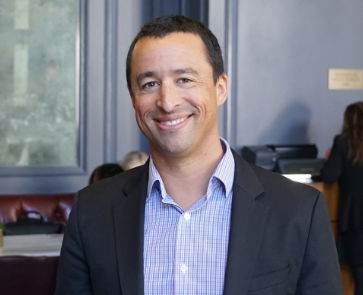
Empower’s $3.4 billion deal ups total assets to $1.4 trillion, a distant second to Fidelity’s $3.2 trillion in administered assets.
Robert Reynolds and Edmund F. Murphy III both left long careers at Fidelity Investments with an eye on recreating the magic of the Boston giant’s retirement business at deep-pocketed Great-West Lifeco of Canada.
But despite a near decade-long spending spree that saw the merger in 2014 of Great-West Financial, JPMorgan Chase, and Putnam Investments record-keeping units into a single subsidiary–Empower Retirement– their chief rival has proved to be an elusive target. See: Bob Reynolds strikes again in his 401(k) quest — this time buying JPMorgan’s retirement recordkeeping business
Empower this week announced its fifth acquisition in a little over a year, a $3.55 billion deal for Prudential’s record-keeping business that will add more than 4,300 workplace savings plans, about 4 million plan participants and $314 billion in assets.
“[Prudential has] been looking to sell their recordkeeping business because they didn’t see it as an attractive business to retain,” says Shawn O’Brien, senior analyst with Boston-based Cerulli Analysts.
Firms are getting rid of their 401k recordkeeping units because a ban on revenue sharing killed their margins and limitations on pushing proprietary products hurt their viability as loss leaders, he adds.
“Record-keepers can’t deploy these revenue-sharing arrangements as they could five years ago.”
Scale game
Empower spokesman Stephen Gawlik says Prudential is plenty attractive for its ability to solidly serve a mature clientele.
“We believe it’s highly regarded in the industry. It’s a very robust retirement plan. They have a terrific tenure of clients and the average was 17 years.”
The latest deal brings the Greenwood, Colo 401(k) record-keeper up to $1.4 trillion under administration, or just about where Fidelity’s retirement service was in… 2015. Fidelity has since grown to $3.2 trillion, an inside source says.
That leaves Empower still a distant second in what has become a purely scale game.
“There is very little differentiation in the services or in the pricing. The result is that ‘scale’ is the only growth path,” says Louis Harvey, president of Boston-based Dalbar Inc.
Time to reassess?
Reynolds is now president and CEO of Putnam Investments and Murphy is president and CEO of Empower Retirement. After 24 years, Reynolds left behind his job as Fidelity Vice Chairman and Fidelity Investments COO to join Putnam in 2008.

Murphy, a 17-year Fidelity veteran, followed a year later.
Great-West Lifeco began its acquisition spree 2003 when it purchased Canada Life Financial for $4.7 billion and Putnam Investment Trust four years later for $3.9 billion. It added a health network in the mix but sold it to CIGNA in 2008.
Since 2014, the modern iteration of Empower Retirement has been an indirect wholly-owned subsidiary of Great-West Lifeco US.
If wholesale acquisitions are the linchpin of its strategy to add scale; then it may have to reassess.
Fidelity has added $500 million of 401(k) and 403(b) assets in just the past six months alone (ended June 30), mostly through organic growth.
While market gains added an estimated $115.5 billion in new assets to its platform in 2020, Fidelity still has 30,000 plan sponsors. See: Fidelity Investments flies past staggering $10T milestone, but Schwab, finally fully loaded with Q1 results from TDA merger, steals some of the Boston giant’s thunder
Mike Alfred, co-founder of Brightscope, a 401(k) plan tracker, says Empower has at least one distinct advantage.
“Empower is the more focused and hungry player,” he notes.
Indeed, since June last year, it has acquired Personal Capital, an investment and wealth management adviser, for $825 million; the retirement plan business of MassMutual for $4.4 billion, Trust Bank’s SunTrust 401(k) recordkeeping business and Fifth Third Bank’s recordkeeping business. See: IPO dreams die, but Personal Capital gets ‘$1 billion’ price tag from life insurance giant’s 401(k) unit that includes a de facto discount from early-bird VC dollars
Size counts
Empower’s success has been creating a giant company by merging these tiny firms, says Alfred.

“After rolling together the retirement businesses of Great-West, Putnam, JPM, MassMutual, Fifth Third and Prudential, Empower has bulked up to become the most formidable player in the record-keeper ecosystem.”
In comparison, Fidelity’s path has been organic for decades building out its retirement business but also its wealth management business and all of its lines of business, O’Brien says.
Fidelity, by dint of its business lines and size ($10.4 trillion in total assets), has the ability to grow organically as part of a grander mosaic that is all but impossible to replicate.
“Fidelity can do virtually anything,” O’Brien says.
“They can do recordkeeping; they can do IRAs; they’re a custodian. They can provide wealth management, financial planning. They’re a reputable asset manager. They cover virtually all areas of the retirement landscape and not many providers can do that.”
Fidelity also wins because it pours resources into its business to insure it has a bigger, better offering, says Michael Shamrell, a Fidelity spokesman.
Empower’s leaders offer another advantage because of their ingrained knowledge of the Fidelity way, Alfred says.
“Bob and Ed’s vision to build a true competitor to Fidelity is coming to fruition,” he says.
“With scale comes cost savings and advantages; larger technology investments; stronger participant-facing capabilities and more effective rollover capture.
It’s a two-horse race at this point, and Empower seems hungrier,” he adds.
Distruptive change
The retirement business has been fragmented for years. Trailing Fidelity and Empower are TIAA-CREF with $656.5 billion as of Sept. 30, 2020, and Vanguard Group Inc., with $592.7 billion in assets, according to Pensions and Investments.
The wholesale exodus of long-time players is also opening the door to upstarts, O’Brien says.
New York-based startup Vestwell, an online recordkeeper, just raised $70 million in its latest venture capital raise. See: Third-party investors throw another $70 million at Vestwell, after 401(k)-type plans using its administration and recordkeeping services tripled over the past year
One thing that is certain more consolidation will occur, says Harvey.
The outcome of the Empower/Fidelity horse race will be determined by one of two factors: Market disruption or more acquisitions.”
“Both firms have the ability to be disruptive by changing the service/pricing model. My guess is that this will come in the form of in-plan retirement services and changing from an investment-based revenue model,” Harvey adds.
